Cognitive Search User#
Profile: Cognitive Search User
This page details cognitive search as it relates to you as the end user on the Squirro platform.
For in-depth learning, see our Deep Dive into Cognitive Search course offering at the Squirro Academy.
Overview#
As the end user, cognitive search is a tool that enables you to perform your work better by helping you find more relevant information quicker.
With that said, at its highest potential, cognitive search is about more than faster and more relevant results.
Cognitive search can lead you to questions or ideas you hadn’t considered before searching, adding tangible value to your work beyond efficiency.
By understanding the intent and context of your search, Cognitive Search can help you answer the questions you haven’t thought of yet.
What is Cognitive Search?#
Cognitive search is better search, thanks to artificial intelligence (AI). It is a form of augmented intelligence, meaning that a user’s search is supported and enhanced by AI.
Cognitive search differs from traditional keyword search because it seeks to understand user intent rather than keywords alone. The goal of cognitive search is to leverage AI assistance to return insights and answers where traditional search returns only results.
Think of cognitive search as traditional search, but with layers of artificial intelligence continually added to it, and all of those layers continually upgraded and improved over time.
Cognitive search is not a new type of search; it is the evolution of traditional search.
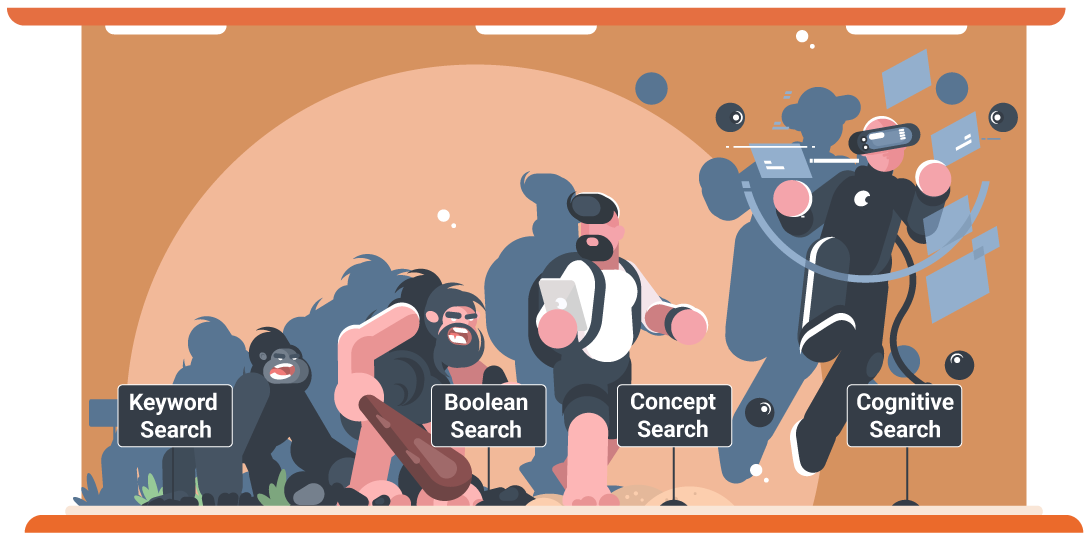
Locating Cognitive Search#
Cognitive search is a core product offered by Squirro.
You can perform cognitive search using the primary search bar at the top of your Squirro platform dashboard.
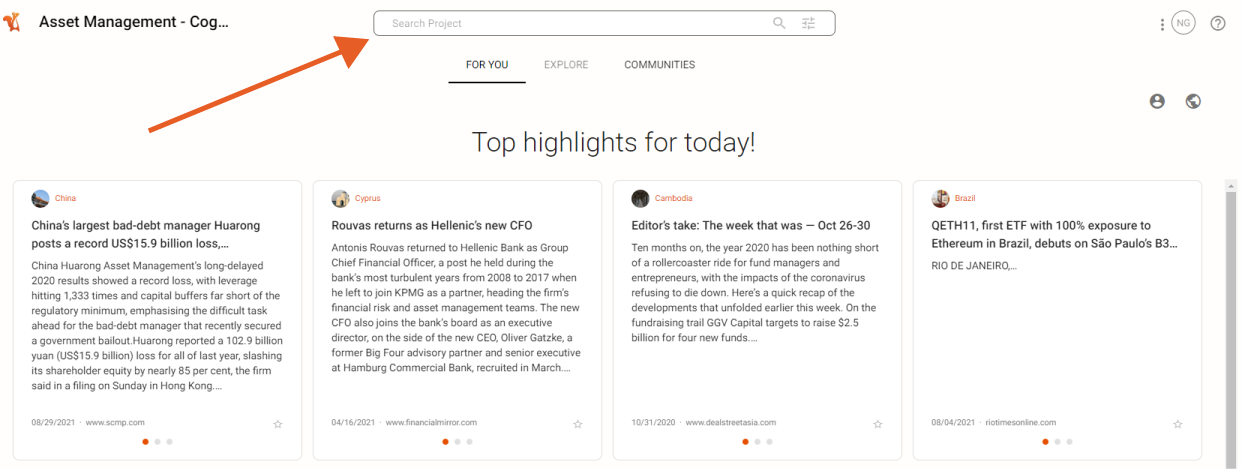
Using Cognitive Search#
Cognitive search is a form of augmented intelligence. This means that its effectiveness depends, to some extent, on the behavior of the person using it.
The strength of the AI-powered support your search benefits from depends on two things:
Your project setup
Your personal search technique
Project Setup#
Quality in, quality out.
The better the data sources connected to your project and the better configured your project is, the better cognitive search performs.
You may not have access to your project’s setup as a user. Still, you can help improve the functionality of your search by providing feedback to your Project Creator on what’s working, what isn’t, and noting if there are any additional data sets your project could benefit from adding.
Search Technique#
Most people search by entering a keyword or keyword phrase into the search bar and clicking the search button.
You can still reap the benefits of cognitive search by searching like this, but there are also more advanced ways to search that allow you to take fuller advantage of AI augmentation.
The following section discusses Squirro’s advanced search features and how you can use them to leverage the power of cognitive search.
Note: Some of the following features may not be a default part of your project. If you see a feature you don’t have access to, speak with your Project Creator for help.
Cognitive Search Features#
This section introduces the cognitive Search features you can use to return better, more relevant results.
Advanced Query Syntax#
Query/syntax refers to how the text entered into the search bar is structured.
Using advanced query syntax can return more focused and more relevant results. The following are a few examples of advanced search query options:
Boolean operators like AND, OR, NOT to require or exclude certain keywords.
Wildcards like ? or “*” to use partial keyword matching.
Field limiting using $**<field>:**
A caret (^) to boost the relevance of a specific search term.
Reference: Download the Query/Syntax Cheat Sheet for quick tips.
Communities#
Communities is a powerful Squirro feature that allows you to prioritize results within your project and view results by community.
You can subscribe to and unsubscribe from communities relevant to your interests by clicking on the Communities tab under the search bar.
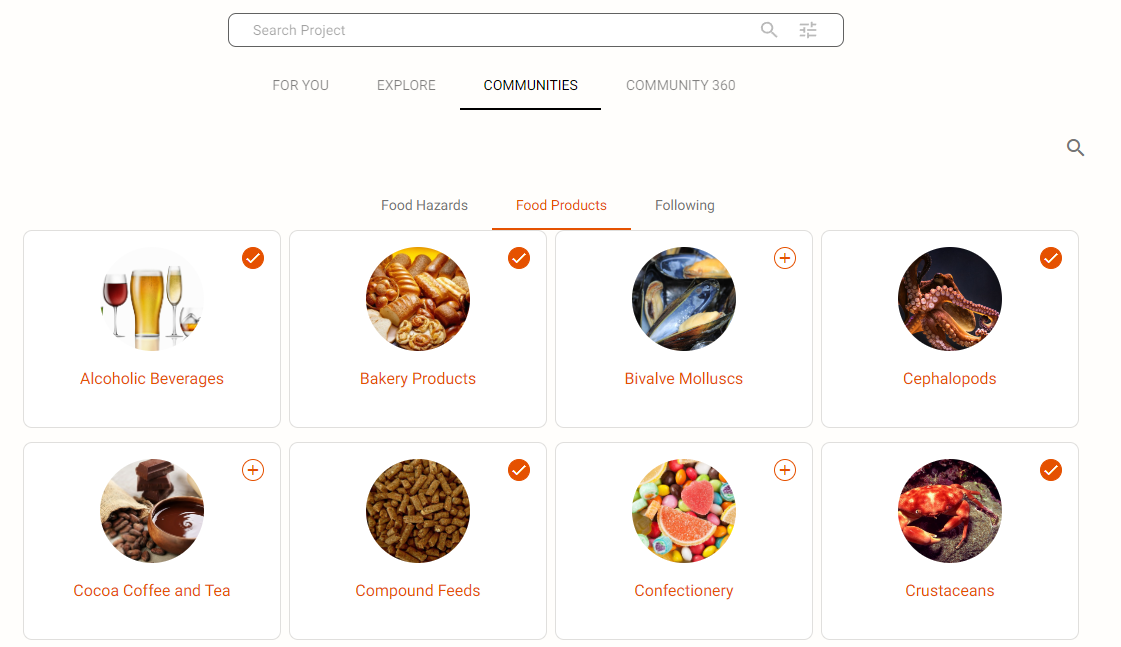
When Squirro returns your search results, the communities widget displays the most relevant communities to your search query, allowing you to subscribe to those communities on the spot.
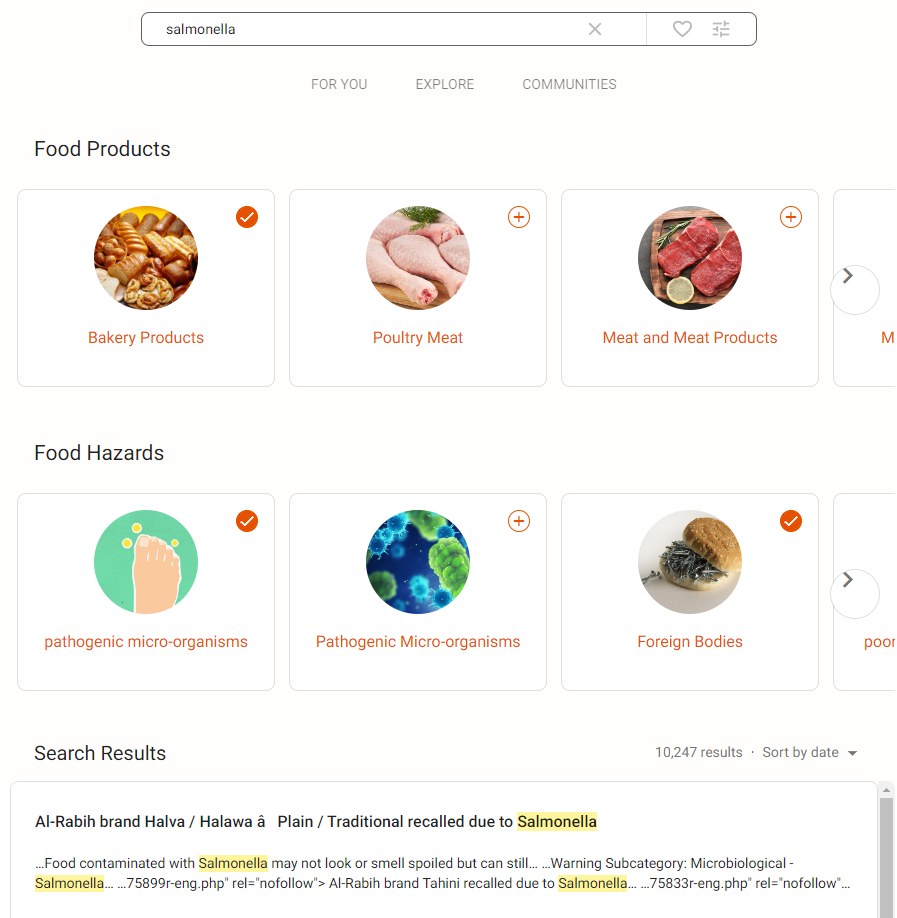
Your Project Creator manages your project’s communities.
Concept Search#
This feature allows you to search using a selected text block, rather than keywords, as your input.
Concept search asks Squirro to evaluate an identified text block and search for contextually similar results.
There are two ways to perform a concept search with Squirro:
Selecting a block of relevant text with your cursor and clicking the search icon that appears
Copying a block of text from an external source and pasting it into the search bar and searching.
Using the Concept Search Icon#
A concept search does not require using the search bar with the select text/search icon method.
When you select a text block and click the search icon, Squirro evaluates your highlighted text and returns contextually relevant results.
Note: There is no limit to the amount of text you can select.
Copy/Paste Concept Search#
Concept search can also be performed by copy/pasting a block of text into the search bar. Squirro will automatically recognize you are looking to perform a concept search based on the text input size into the search bar.
Squirro will contextualize the pasted text block and search for relevant results within your project.
Note: The copied text does not have to come from an internal document. You can copy text from an external source (Wikipedia, for example) and paste the text into the search bar.
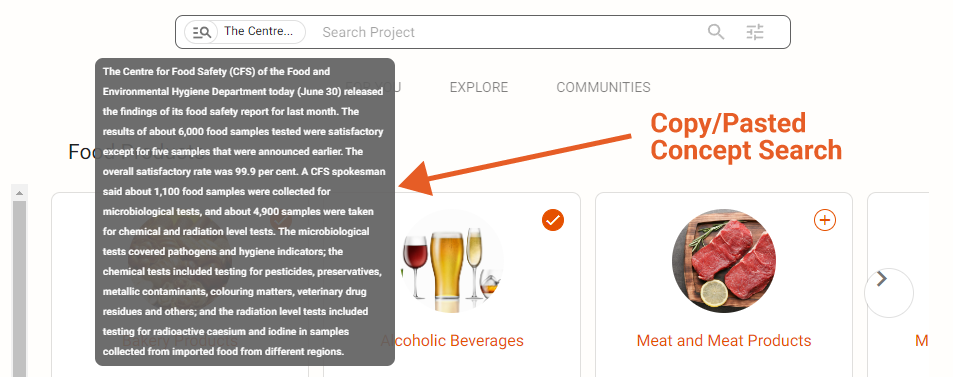
Other People Ask#
This feature provides suggestions for search terms relevant to your intent based on other people’s search queries.
Other People Ask goes beyond suggesting superficially similar terms, however. It looks at the meaning behind the original search term and provides semantically-related suggestions.
The feature presents as a widget next to your search results.
Your Project Creator can modify the configuration of this feature to fine-tune results.
Question Answering#
This feature presents a direct answer to a user search question separately from the search results list (in its own widget.)
Not all questions have direct answers, however. This feature will not always apply, but it will provide a direct answer to a question where possible.
The feature highlights an answer within its document context while providing a link to the document.
To activate this feature, formulate your search as a question. For example, instead of searching for “birth year Albert Einstein” and browsing keyword results, search “What year was Albert Einstein born” and Squirro will return the answer “1879”.
Note: A question mark is not required to trigger this feature.
Typeahead#
This feature presents search suggestions as you type within the search bar.
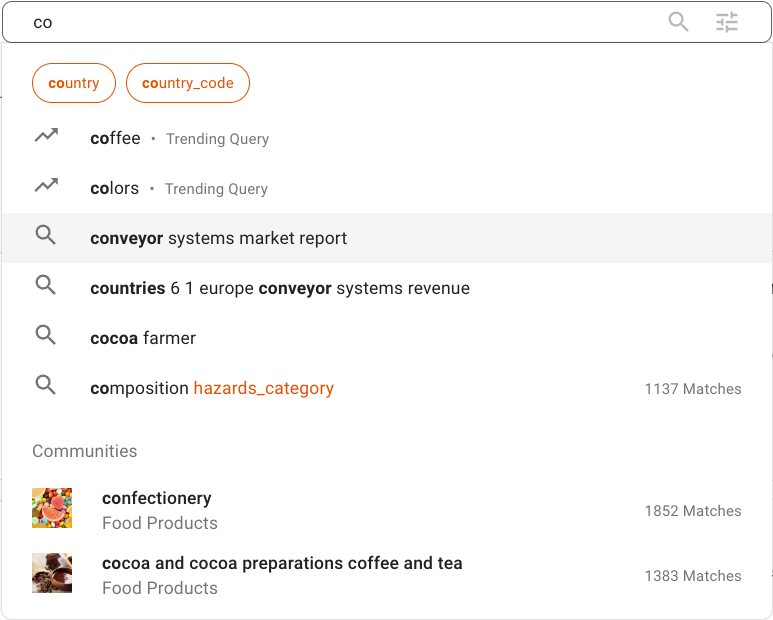
Depending on your project setup and specific search query, two types of Typeahead suggestions may present:
Document-generated suggestions
Activity-generated suggestions
Document-generated suggestions#
These suggestions are generated based on the content of your project documents. There are three types of document-generated suggestions:
Content suggestions, based on Squirro’s underlying search algorithms paired with your project’s documents. These suggestions attempt to predict your search input based on project content.
Label suggestions, based on predefined project labels. Squirro presents these as suggestions in orange, surrounded by an orange outline.
Communities suggestions, based on predefined project communities. Squirro presents these under the Communities subheading.
User-generated suggestions#
These suggestions are generated based on your user activity within your project, including your own activity. There are three types of activity-generated suggestions:
Saved searches suggestions, based on searches that you have saved within your dashboard.
Search history suggestions, based upon your previous search activity within Squirro.
Popular queries suggestions, based on popular search queries of other users across the project.
Spell Check#
When Squirro identifies a misspelled search query, it will suggest the word’s correct spelling as a new search term through the spell check widget.
Clicking the suggested term will re-run the search with the correct spelling.

Synonyms#
Synonym lists can be powerful search tools, especially within projects containing many industry-specific terms or jargon. Squirro can also apply synonym lists to specific groups of documents.
However, modification of the synonym feature is not directly available to the end search user. If you have a list of synonyms to improve search performance, speak with your Project Creator for help.
FAQ & Troubleshooting#
Q1: Where can I log into my Squirro dashboard?
Login to your dashboard at start.squirro.com.
Click on My Instances in the upper right-hand corner.
Select your desired instance.
Q2: I forgot my password, what can I do?
Click Forgot Password? on the login screen and follow the instructions.
If you’ve forgotten your user ID, contact your Project Creator for help.
If you’re unsure who your Project Creator is, contact Squirro Support for assistance.
Q3: I see a feature listed that is not available to me in my dashboard, how do I access this feature?
Not all features are automatically available on all projects. Contact your Project Creator to discuss adding additional features to your project.
